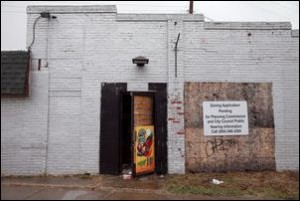I was planning to blog today about the sad fate of Tarek Hezam, a New Yorker who moved to the Richmond region and opened a convenience store in the Oak Grove neighborhood of the city in 2013. After neighbors complained that the store became a magnet for trash and crime, the City of Richmond revoked his certificate of zoning compliance, suddenly discovering that, oh, so sorry, they’d overlooked the fact that commercial zoning for the site had expired back in 1975. Between rent, startup costs and lawyer fees, Hezam is out $160,000.
But Bart Hinkle at the Times-Dispatch beat me to to the commentary — and he did a fine job of it, so I’ll just quote liberally from his column.
The city administration talks a good game about economic development, Hinkle writes, and it’s more than happy to work with the big boys on grandiose projects like the Shockoe Bottom ballpark, the Redskins training camp and the Stone Brewery development. But what does it say to small entrepreneurs who aren’t rich and politically connected? “Drop dead.”
Malcontents are worried about trash in the streets. But who is responsible for that? “Five bucks says Hezam doesn’t spend his spare time throwing garbage around the neighborhood,” writes Hinkle. “Nor, for another five bucks, do people drive in from North Side or Westover Hills to toss their empty chip bags and soda cups on the ground. If litter is a problem, then the solution is to tackle littering head-on.”
Some in the community also complained that Hezam was peddling the usual junk food fare found in inner-city convenience stores. Rosa Jones, president of the Oak Grove Civic Association, suggested he should bring a shoe shop “or something we can use.” As Hinkle observes, “Jones hasn’t sunk tens of thousands of her own dollars into the project. Until she does, she has no business telling the person who has invested his own money what to do with it. If she really wants a shoe shop in the neighborhood, then she’s welcome to open one herself — if the city will let her, that is.”
There is a crying need for jobs and investments in inner-city Richmond, but city officials have shut down one small entrepreneur who would create both at no expense or risk to the taxpayer. What kind of signal does that send to others, Hinkle wonders.
Hezam offered to change his retail format to a takeout restaurant serving fried chicken and fish but no alcohol. The planning commission shot him down. He plans to sue the city for relief. “If a judge in their right mind tells me I don’t have a claim,” he said, “then I shouldn’t be in Virginia.
— JAB



